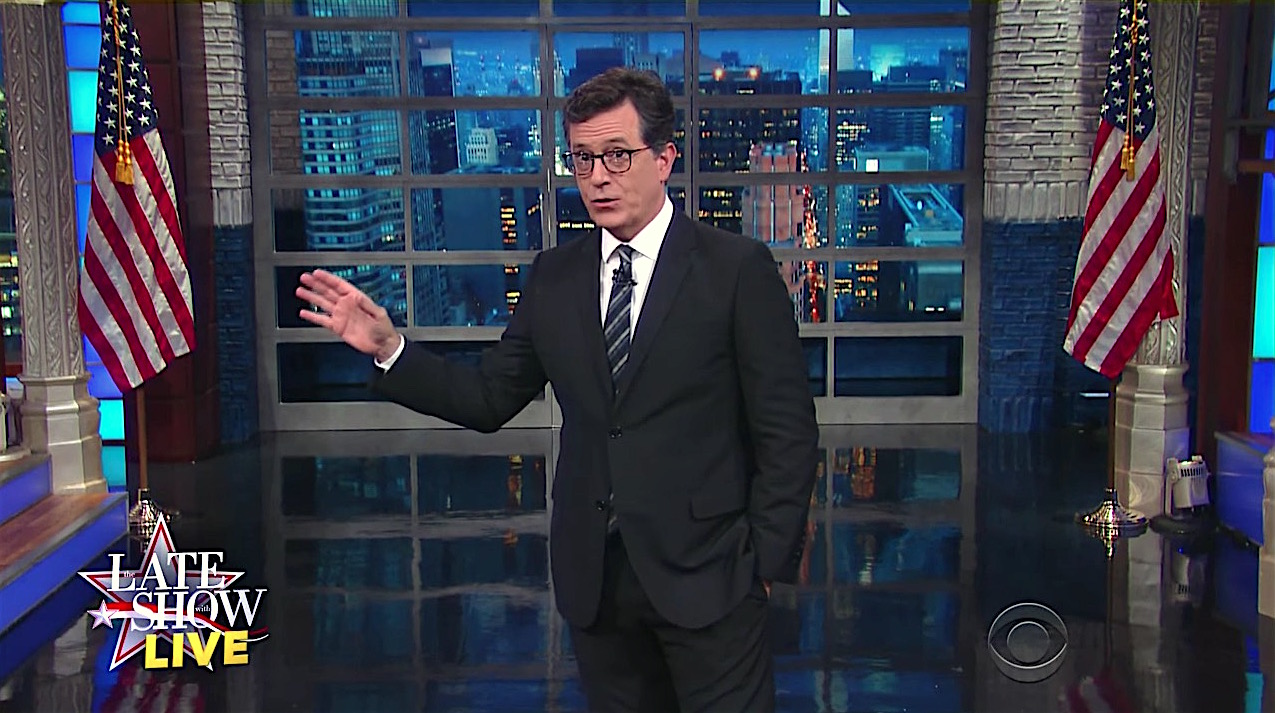Stephen Colbert recaps Night 1 of the Democratic National Convention


A free daily email with the biggest news stories of the day – and the best features from TheWeek.com
You are now subscribed
Your newsletter sign-up was successful
The first day of the Democratic National Convention on Monday had its ups and downs, Stephen Colbert said in his live post-convention Late Show monologue. "Bernie Sanders heartily endorsed Hillary Clinton," he said. "It was an impassioned speech, but disappointed some of his supporters. I have not seen that many crying women since Bernie opened for the Beatles." But Day 1 of the Democratic convention was "also known as Hillary Clinton and the terrible, horrible, no-good, very bad day," Colbert said, mostly due to Friday's leak of 19,000 hacked Democratic National Committee emails, showing the DNC favoring Clinton over Sanders.
"In an unprecedented show of bias, the Democrats threw their weight behind the registered Democrat," Colbert said. "That's not fair. That's like Sam's Club refusing to take your Blockbuster card." But if the day started out rocky on Monday, "by early evening, things had calmed down," he said. "But then Bernie supporter Sarah Silverman and Hillary supporter Al Franken took the stage, and Sarah got a little tired of the crowd," telling the "Bernie or Bust" crowd they are being "ridiculous." "Wow, it is rare when the comedian heckles the audience," Colbert said.
"There were a lot of great speeches tonight, but leave it to Michelle Obama to truly unify the Democrats," Colbert said. "With tonight's moving speech, she convinced everyone in that arena that it was finally time to elect as president of the United States former First Lady Michelle Obama. She crushed it." Colbert ended with a joke so obvious he would be negligent in not making it: "Anyway, Michelle's speech was so good, I want to hear it again. When is Melania doing it?" Watch below. Peter Weber
The Week
Escape your echo chamber. Get the facts behind the news, plus analysis from multiple perspectives.

Sign up for The Week's Free Newsletters
From our morning news briefing to a weekly Good News Newsletter, get the best of The Week delivered directly to your inbox.
From our morning news briefing to a weekly Good News Newsletter, get the best of The Week delivered directly to your inbox.
A free daily email with the biggest news stories of the day – and the best features from TheWeek.com
Peter has worked as a news and culture writer and editor at The Week since the site's launch in 2008. He covers politics, world affairs, religion and cultural currents. His journalism career began as a copy editor at a financial newswire and has included editorial positions at The New York Times Magazine, Facts on File, and Oregon State University.
-
 Political cartoons for February 22
Political cartoons for February 22Cartoons Sunday’s political cartoons include Black history month, bloodsuckers, and more
-
 The mystery of flight MH370
The mystery of flight MH370The Explainer In 2014, the passenger plane vanished without trace. Twelve years on, a new operation is under way to find the wreckage of the doomed airliner
-
 5 royally funny cartoons about the former prince Andrew’s arrest
5 royally funny cartoons about the former prince Andrew’s arrestCartoons Artists take on falling from grace, kingly manners, and more
-
 ‘One Battle After Another’ wins Critics Choice honors
‘One Battle After Another’ wins Critics Choice honorsSpeed Read Paul Thomas Anderson’s latest film, which stars Leonardo DiCaprio, won best picture at the 31st Critics Choice Awards
-
 Son arrested over killing of Rob and Michele Reiner
Son arrested over killing of Rob and Michele ReinerSpeed Read Nick, the 32-year-old son of Hollywood director Rob Reiner, has been booked for the murder of his parents
-
 Rob Reiner, wife dead in ‘apparent homicide’
Rob Reiner, wife dead in ‘apparent homicide’speed read The Reiners, found in their Los Angeles home, ‘had injuries consistent with being stabbed’
-
 Hungary’s Krasznahorkai wins Nobel for literature
Hungary’s Krasznahorkai wins Nobel for literatureSpeed Read László Krasznahorkai is the author of acclaimed novels like ‘The Melancholy of Resistance’ and ‘Satantango’
-
 Primatologist Jane Goodall dies at 91
Primatologist Jane Goodall dies at 91Speed Read She rose to fame following her groundbreaking field research with chimpanzees
-
 Florida erases rainbow crosswalk at Pulse nightclub
Florida erases rainbow crosswalk at Pulse nightclubSpeed Read The colorful crosswalk was outside the former LGBTQ nightclub where 49 people were killed in a 2016 shooting
-
 Trump says Smithsonian too focused on slavery's ills
Trump says Smithsonian too focused on slavery's illsSpeed Read The president would prefer the museum to highlight 'success,' 'brightness' and 'the future'
-
 Trump to host Kennedy Honors for Kiss, Stallone
Trump to host Kennedy Honors for Kiss, StalloneSpeed Read Actor Sylvester Stallone and the glam-rock band Kiss were among those named as this year's inductees
